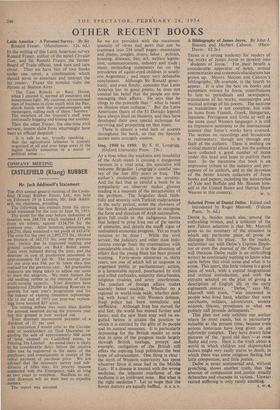Iraq, 1900 to 1950. By S. H. Longrigg. (Oxford University
Press. 25s.) AT a time when the weakness and instability of the Arab states is causing a dangerous vacuum in a vital area, the specialist will welcome Brigadier Longrigg's careful sur- vey of the last fifty years in Iraq. The author's credentials require no scrutiny. And the fact that so careful a book by so sympathetic an observer makes gloomy reading is a measure of the intractability of the problem. The brigadier dealg faith- fully and severely with Turkish malpractices in the early period, notes the slowness of the first British administrators to recognise the force and direction of Arab nationalism, gives full credit to the indigenous forces that helped to prise Iraq out of the inertia of centuries, and details the ma rf signs of undoubted economic progress. Yet so much remains to be done ! While the civil service, the judiciary and other state insti- tutions emerge from the examination with considerable credit, it is in the direction of affairs that the young State has been proved wanting. Forty-seven ministries in thirty years, not one of which fell in response to organised public or parliamentary action, is a lamentable record, punctuated by civil and tribal outbreaks, minority disturbances, religious rivalries and army interference. The conduct of foreign affairs makes scarcely better reading., on a regional or world-wide, scale, whether deal- ing with Israel or with Western defence, Iraqi policy has been unrealistic and ineffective. Although Iraq has moved far and fast, the world has moved further and faster, and the new State may well be en- gulfed before it attains the position to which it is entitled by the gifts of its people and its natural resources. It is particularly depressing for the British reader to note that in spite of the progress made largely through British tutelage, precept and example, castigation of the British still offers the aspiring Iraqi politician the best hope of advancement. One thing is clear : the myth of Western superiority has spent whatever force it once had in the Middle East. If a disease is treated with the wrong medicine, the inherent excellence of the medicine is an irrelevant issue. But what is the right medicine ? Let us hope that the Soviet doctors are equally baffled. H. A. R. P.


































 Previous page
Previous page